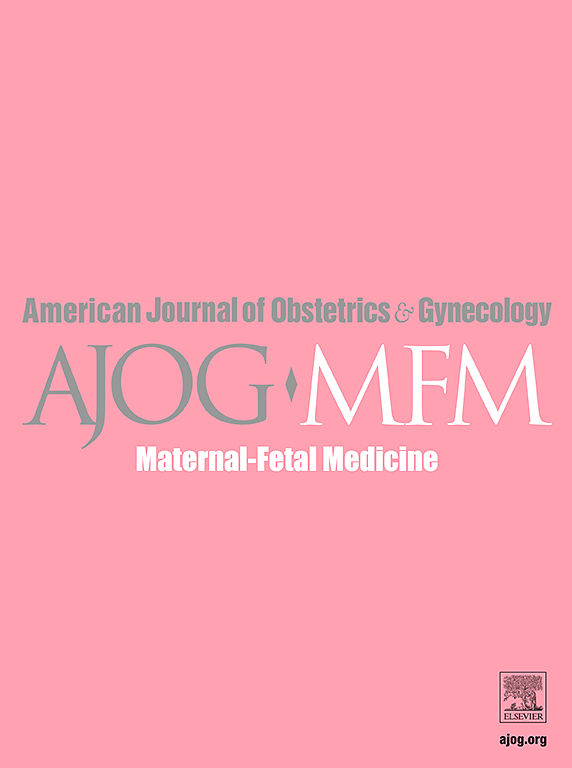Postpartum readmissions among patients with adult congenital heart disease
IF 3.8
2区 医学
Q1 OBSTETRICS & GYNECOLOGY
American Journal of Obstetrics & Gynecology Mfm
Pub Date : 2025-02-01
DOI:10.1016/j.ajogmf.2024.101580
引用次数: 0
Abstract
BACKGROUND
Given the risks associated with congenital heart disease in the postpartum period, epidemiologic data identifying risk factors and timing of complications may be useful in improving postpartum care.
OBJECTIVE
This study aimed to determine the timing of, risk factors for, and complications associated with 60-day postpartum readmissions following deliveries with maternal congenital heart disease.
STUDY DESIGN
The 2010–2020 Nationwide Readmissions Database was used for this retrospective cohort study. Postpartum readmissions occurring within 60 days of delivery hospitalization discharge were ascertained. Clinical, demographic, and hospital risk factors associated with postpartum readmission were analyzed using logistic regression models, with unadjusted and adjusted odds ratios as measures of association. Among patients with congenital heart disease, the role of additional cardiac risk factors in the likelihood of readmission was analyzed. Risks for adverse maternal outcomes during readmission were analyzed, including severe maternal morbidity, cardiac severe maternal morbidity, and a critical care composite.
RESULTS
Of an estimated 40,780,439 delivery hospitalizations, 35,242 had an associated congenital heart disease diagnosis (8.6 per 10,000), including 2279 (6.5%) with complex congenital heart disease and 32,963 (93.5%) with noncomplex congenital heart disease. The proportion of deliveries with a maternal congenital heart disease diagnosis increased significantly from 6.7 per 10,000 in 2010 to 11.8 in 2020. Overall risk for 60-day postpartum readmission was 1.6% among women without congenital heart disease and 3.1% among women with congenital heart disease (P<.01). Among women with congenital heart disease, 36.0% of 60-day postpartum readmissions occurred 1 to 5 days after discharge, 18.0% 5 to 10 days after discharge, and 14.5% 10 to 20 days after discharge. In adjusted models for the entire population, congenital heart disease retained a significant association with 60-day postpartum readmission (adjusted odds ratio, 1.73; 95% confidence interval, 1.55–1.94). When the cohort was restricted to deliveries with congenital heart disease, adjusted analyses demonstrated increased odds associated with additional cardiac risk factors (congestive heart failure: adjusted odds ratio, 1.72; 95% confidence interval, 1.13–2.62; arrhythmia: adjusted odds ratio, 1.68; 95% confidence interval, 1.27–2.21; pulmonary circulation disorders: adjusted odds ratio, 1.57; 95% confidence interval, 1.10–2.24; and chronic hypertension: adjusted odds ratio, 1.88; 95% confidence interval, 1.26–2.80), hypertensive disorders of pregnancy (adjusted odds ratio, 1.97; 95% confidence interval, 1.49–2.61), and cesarean delivery (primary adjusted odds ratio, 1.82; 95% confidence interval, 1.39–2.38; repeat cesarean: adjusted odds ratio, 1.91; 95% confidence interval, 1.42–2.55). The risk of adverse outcomes during readmissions was higher for women with congenital heart disease than for those without (severe maternal morbidity: 23.8% vs 16.1%; P<.01; cardiac severe maternal morbidity: 9.6% vs 4.9%; P<.01; and a critical care composite: 3.1% vs 1.8%; P<.01).
CONCLUSION
Deliveries with congenital heart disease were associated with increased odds of postpartum readmission and complications during readmissions. Most readmissions occurred soon after delivery discharge. Among patients with congenital heart disease, risk for readmission was higher in the setting of additional cardiac risk factors, hypertensive disorders of pregnancy, and cesarean delivery.
成人先天性心脏病患者产后再入院的研究
背景:考虑到产后冠心病的相关风险,流行病学数据识别危险因素和并发症的发生时间可能有助于改善产后护理。目的:本研究的目的是确定产妇先天性心脏病(CHD)分娩后60天再入院的时机、危险因素和并发症。研究设计:本回顾性队列研究使用2010-2020年全国再入院数据库。确定产后60天内再次住院出院的情况。采用logistic回归模型分析与产后再入院相关的临床、人口统计学和医院危险因素,并以未调整和调整的优势比(aORs)作为关联指标。在冠心病患者中,分析了其他心脏危险因素在再入院可能性中的作用。再入院期间产妇不良结局的风险,包括严重产妇发病率(SMM)、心脏SMM和重症监护组合。结果:在估计的40,780,439例分娩住院中,35,242例有相关的冠心病诊断(每10,000人中有8.6例),其中2,279例(6.5%)为复杂冠心病,32,963例(93.5%)为非复杂冠心病。诊断为冠心病的产妇分娩比例从2010年的6.7 / 10,000显著增加到2020年的11.8 / 10,000。无冠心病妇女产后60天再入院的总风险为1.6%,冠心病妇女为3.1%(结论:冠心病分娩与产后再入院和再入院期间并发症的发生率增加有关)。大多数再入院发生在分娩出院后不久。在冠心病患者中,在其他心脏危险因素、妊娠高血压疾病和剖宫产的情况下,再入院风险更高。
本文章由计算机程序翻译,如有差异,请以英文原文为准。
求助全文
约1分钟内获得全文
求助全文
来源期刊

American Journal of Obstetrics & Gynecology Mfm
Medicine-Medicine (all)
CiteScore
7.40
自引率
3.20%
发文量
254
审稿时长
40 days
期刊介绍:
The American Journal of Obstetrics and Gynecology (AJOG) is a highly esteemed publication with two companion titles. One of these is the American Journal of Obstetrics and Gynecology Maternal-Fetal Medicine (AJOG MFM), which is dedicated to the latest research in the field of maternal-fetal medicine, specifically concerning high-risk pregnancies. The journal encompasses a wide range of topics, including:
Maternal Complications: It addresses significant studies that have the potential to change clinical practice regarding complications faced by pregnant women.
Fetal Complications: The journal covers prenatal diagnosis, ultrasound, and genetic issues related to the fetus, providing insights into the management and care of fetal health.
Prenatal Care: It discusses the best practices in prenatal care to ensure the health and well-being of both the mother and the unborn child.
Intrapartum Care: It provides guidance on the care provided during the childbirth process, which is critical for the safety of both mother and baby.
Postpartum Issues: The journal also tackles issues that arise after childbirth, focusing on the postpartum period and its implications for maternal health. AJOG MFM serves as a reliable forum for peer-reviewed research, with a preference for randomized trials and meta-analyses. The goal is to equip researchers and clinicians with the most current information and evidence-based strategies to effectively manage high-risk pregnancies and to provide the best possible care for mothers and their unborn children.
 求助内容:
求助内容: 应助结果提醒方式:
应助结果提醒方式:


